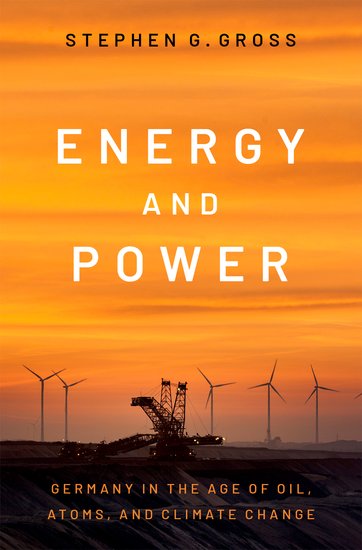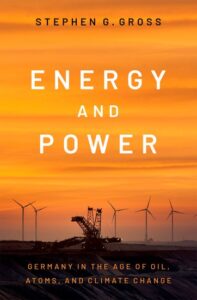

On February 27, 2022, German Chancellor Olaf Scholz told the Bundestag that the Russian invasion of Ukraine, which had begun three days earlier, marked “a watershed in the history of our continent.”[1] All across Europe, the war’s outbreak prompted paeans to the defense of democracy and a flood of new military spending. It also brought energy matters to the forefront of political discussions—especially in Germany, where Russian gas comprised a cornerstone of the country’s energy mix and was considered indispensable for energy-intensive industries. While the public familiarized itself with the capacity of the nation’s natural gas reserves and consumers wondered how they would pay rapidly rising electric bills, conservative politicians called for a postponement of the country’s long-planned nuclear phase-out. At the same time as the liberal Free Democratic Party leader and Minister of Finance, Christian Lindner, praised renewables as “freedom energies” that would help Germany gain energy independence,[2] the Green Minister of Economics, Robert Habeck, departed Berlin in order to pursue a new gas agreement with the Emir of Qatar and galvanize the construction of liquefied natural gas (LNG) terminals along the German coast.
The Germans’ responses to the historical watershed of February 2022 exemplify not only how important questions about energy have become in German political and economic life, but also how closely energy matters are interwoven into a host of other seminal political disputes. Stephen Gross’s new monograph, Energy and Power: Germany in the Age of Oil, Atoms, and Climate Change is devoted to explaining this development, by which “energy came to be the central problem of German economics and politics in the twenty-first century” (3).
Energy and Power is set in two Germanys, Cold War-era West Germany and the reunified Berlin Republic (the East German case remains beyond the scope of Gross’s analysis); it is primarily the story of how two competing ideas about the relationship between energy use and economic growth have influenced politics and society. That story begins in the immediate post-war years, when West Germany was born with “both feet planted in an older energy system defined more by limits than abundance” (22). Envious of Americans’ high standard of living and enabled by Marshall Plan aid, West Germans looked beyond domestic coal resources, and began importing oil in order to build a “high energy society” (7) of their own. Its advent brought new concerns about energy use’s influence on economic growth—and eventually on the environment, too. Hence, Gross’s story ends in the twenty-first century, with nuanced considerations of how the impressive rise of renewable energy production in reunified Germany fits into the longstanding debates about energy use and economic growth that he narrates in this book.
At the center of Gross’s account are Germans’ persistent concerns about energy security and supply and an ongoing argument over whether or not energy use correlates directly with economic growth. According to the “coupling paradigm,” which guided German politicians and economists as they moved to establish a high energy society in the first place, the more energy a society uses, the greater its economic output. From this viewpoint, continued economic growth—and the lifestyles it enables—requires an ever-increasing supply of energy. While the coupling paradigm was expounded in research institutes and put into practice through arcane policy decisions, it was easily legible to the public in the “profound transformation in daily life” (77) that occurred over the course of the 1960s on account of West Germany’s access to a seemingly boundless reservoir of cheap oil.
Though the premise of coupling is straightforward enough, one of Gross’s key contributions is to show that economic thought under the coupling paradigm was no monolith. Instead, politicians brought coupling in line with their views on how the economy ought to be organized. In the early 1960s, when an abundant energy supply was taken for granted, ordo-liberals like Ludwig Erhardt believed open markets and competition among small firms would keep energy prices down. Faced with scarcity after the Six Day Way and the 1973 oil shock, the Social Democratic politicians who came to power in the late 1960s tried to keep energy cheap on the basis of economies of scale and state intervention. After ineffective efforts to “build a fully integrated oil company” (95) with domestic refining capacity and owned rights to foreign crude, they turned the pursuit of nuclear energy into a project of what Gross dubs the “entrepreneurial state” (99).
Since West Germany was the only major West European economy without an oil major of its own, leading Social Democrats perceived their pursuit of “bigness” (97) as the only viable means of maintaining Germans’ access to an abundant supply of cheap energy. Here, as at several other key points in Gross’s narrative, the relationship between the particularities of German history and energy questions’ salience comes into view. The Social Democrats’ efforts to go big—especially their embrace of nuclear energy—inspired a backlash that further cemented energy questions’ position as a central issue in West German politics. Politicians, activists, and thinkers associated with the nascent Green party, which the historian Paul Nolte has described as a “German Sonderweg (special path) in the recent history of political parties,” were most deeply concerned.[3] They “viscerally opposed” the “undemocratic concentration of corporate and political power” (214) that they found in big energy politics.
Gross finds more nuanced economic arguments against bigness within the reformist wing of the Social Democratic party itself. These arguments drew on ecological modernization theory, which “moved beyond the zero-sum perception that environmental protection was at odds with economic development or employment, to optimistically argue that these could be harmonized” (207). This approach was the basis for the decoupling paradigm, which proposed that increased energy use was no prerequisite for economic growth. Instead, in line with ecological modernization theory, energy conservation could become the basis for new jobs and economic growth.
These two critiques of policies launched under the old paradigm differed notably. In fact, as Erhardt’s erstwhile advocacy of competition among small firms revealed, arguments directed against bigness need not reject coupling. It is noteworthy, then, that the narrative of Energy and Power arcs towards the green and red critiques’ reconciliation in what Gross calls the “Eco-Alliance,” a group that comprised Green and Social Democratic backbenchers, as well as “ecologists and solar enthusiasts, but also farmers, craftsmen, metalworkers’ unions, and even industrial associations” (290). The Renewable Energy Act, which the Eco-Alliance pushed through parliament in 2000, forced the utilities companies to buy independently produced renewable energy at set prices. Alongside other programs that supported investments, the Act “gave incredible profits to anyone who sank capital into renewables” (298-9). Because it enabled individual Germans to produce electricity in small facilities, the Act was well-suited to the Greens’ criticisms of bigness. At the same time, the Act fulfilled ecological modernization theory advocates’ goal of turning environmental protection into an engine for jobs and growth.
Despite passing a bill that made Germany into one of the world’s leading producers of wind and solar energy, however, the Eco-Alliance had hardly settled the debate between coupling and decoupling. Up to the present, advocates of the old paradigm have continued to argue that low energy prices are essential to the German economy. Robert Habeck’s frantic efforts to secure new gas deals after the historical watershed of February 2022 evidence the old paradigm’s survival in the era of climate change awareness. Even within the renewable energy field, in fact, the old paradigm seems to have some influence. Though Gross sees Germany’s transition to renewable energy as a project carried out by thinkers and politicians who perceived low energy costs as a problem, many renewable energy advocates now argue that renewable energy production is actually cheaper than fossil fuel use. Implicitly, at least, Gross’s framework of competing energy paradigms invites the further exploration of concepts that link smallness with cheap energy. Indeed, the extent to which both paradigms, at the end of the day, turn on visions of economic growth helps explain why liberals like Christian Lindner can promote renewables as “freedom energies.” And that very emphasis on growth also suggests why renewables advocates of all stripes remain dedicated to the vision of a high energy society, in which wind and solar energy will accomplish myriad tasks, including powering factories, propelling automobiles, and heating homes.
By showing how political decision-makers thought about energy, and by connecting energy political innovation with the “landmark developments” (6) of the postwar era, Gross makes a strong argument that “the history of energy is essential for understanding the twentieth century” (15). His book, therefore, prompts a rethinking of historical master narratives. Perhaps most notably, Gross uses energy history to reshape the way economic ideas are incorporated into the history of postwar western Europe. By dissecting energy debates, Gross reveals the importance of differences and developments within individual economic traditions; he also shows how politicians and advocates adopted and re-purposed ideas and terminology from different schools of economic thought, hitching them to visions of the future that could form the basis for new political coalitions and drive social and economic change. Precisely these links between energy politics and ideas about how society ought to be organized portend the extent to which the framework Gross has developed for integrating energy history into modern European history can and should be extended in many other directions. Energy and Power will be a foundational work for scholars working in this vein.
Stephen Milder is Assistant Professor of European Politics and Society at the Rijksuniversiteit Groningen and Research Fellow at the Rachel Carson Center in Munich. He is the author of Greening Democracy: The Anti-Nuclear Movement and Political Environmentalism in West Germany and Beyond (Cambridge, 2017).
Energy and Power: Germany in the Age of Oil, Atoms, and Climate Change
By Stephen Gross
Publisher: Oxford University Press
Hardcover / 416 pages / 2023
ISBN: 9780197667712
[1] Policy statement by Olaf Scholz, Chancellor of the Federal Republic of Germany and Member of the German Bundestag, February 27, 2022 in Berlin: https://www.bundesregierung.de/breg-en/news/policy-statement-by-olaf-scholz-chancellor-of-the-federal-republic-of-germany-and-member-of-the-german-bundestag-27-february-2022-in-berlin-2008378
[2] “Lindner: Erneuerbare Energien sind ‘Freiheitsenergien‘ – Zustimmung von Lauterbach,“ Redaktionsnetzwerk Deutschland, February 27, 2022: https://www.rnd.de/politik/lindner-zu-krieg-in-der-ukraine-erneuerbare-energien-sind-freiheitsenergien-lauterbach-stimmt-zu-ZQGHVBLMTJFJHBB3F3HLNE63NA.html
[3] Paul Nolte, “A Different Sort of Neoliberalism? Making Sense of German History since the 1970s” Bulleting of the GHI 64 (Spring 2019), 20.




